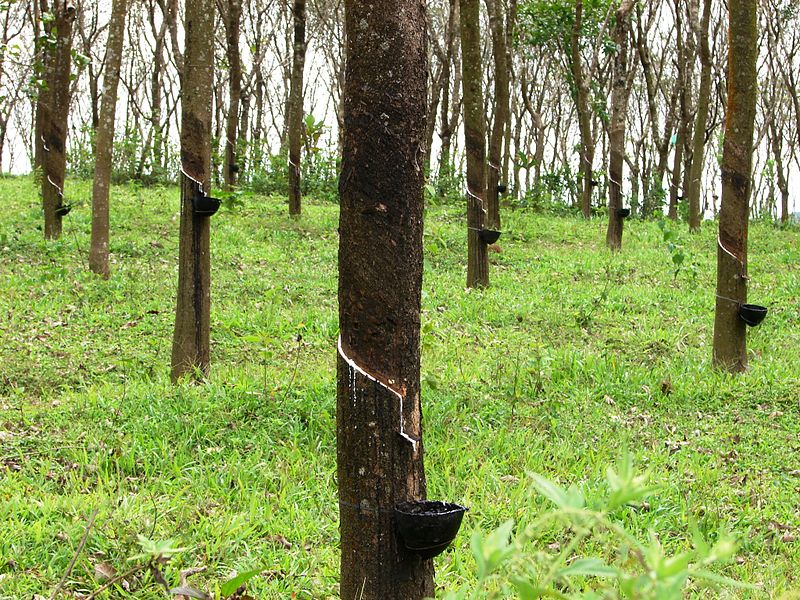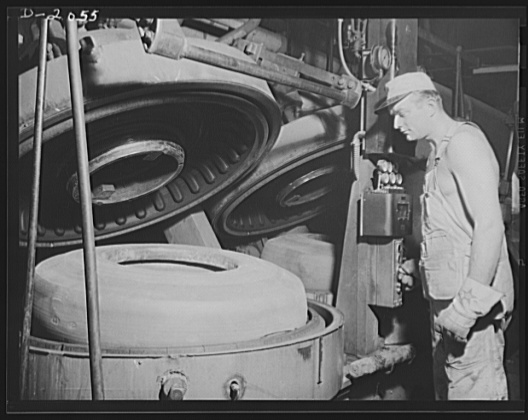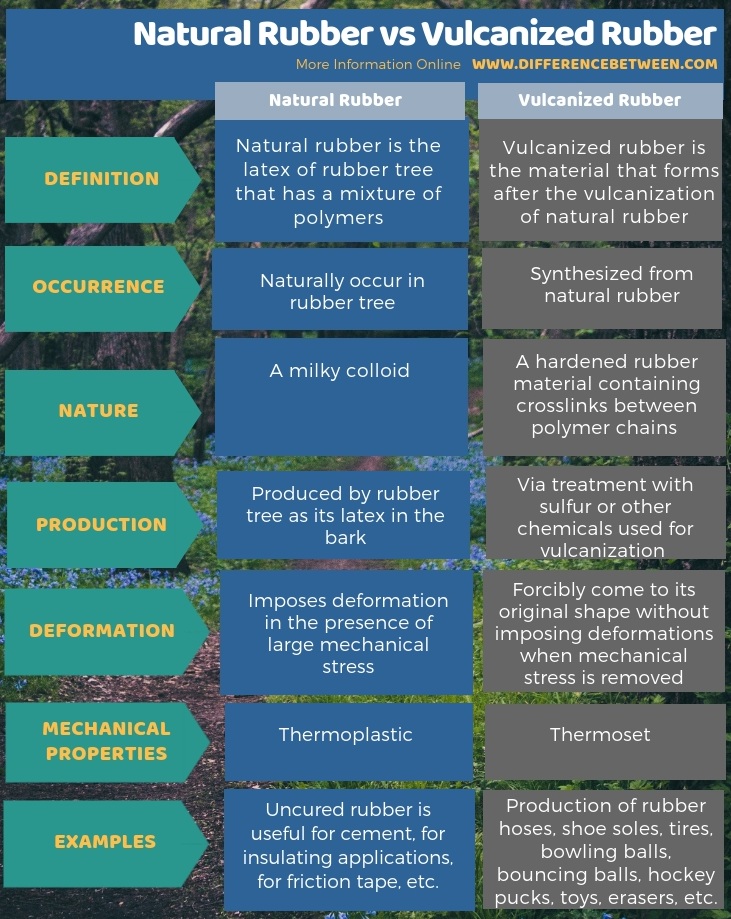The key difference between natural rubber and vulcanized rubber is that the natural rubber is thermoplastic, whereas the vulcanized rubber is a thermoset.
Natural rubber is the rubber material we obtain as latex from rubber trees. The raw latex is not that much of use since it has less desirable properties. To enhance its properties, we can vulcanize rubber using sulfur or another suitable method. Then, we call it “vulcanized rubber”.
CONTENTS
1. Overview and Key Difference
2. What is Natural Rubber
3. What is Vulcanized Rubber
4. Side by Side Comparison – Natural Rubber vs Vulcanized Rubber in Tabular Form
5. Summary
What is Natural Rubber?
Natural rubber is the latex of rubber trees that has a mixture of polymers. The raw latex is sticky and is a milky colloid that comes from incisions made on the bark of rubber trees. We call the collection of the fluid that comes from these incisions of the bark as “tapping”.
Natural rubber latex has cis-1,4-polyisoprene polymer. The molecular weight of this polymer ranges from 100,000 to 1,000,000 Daltons. Typically, 5% of the dry mass of rubber latex is other organic and inorganic materials; the organic materials may include proteins, fatty acids, resins, etc. while inorganic materials include salts. However, some other natural sources of rubber contain trans-1,4-polyisoprene, which is the structural isomer of cis-1,4-polyisoprene.

Figure 01: Tapping
According to their properties, natural rubber is an elastomer and a thermoplastic material. Moreover, the rubber exhibits unique chemical and physical properties. Some of these properties are as follows:
Properties of Rubber
- Hyperplastic nature
- Strain crystallization
- Susceptible to vulcanization
- Sensitive to ozone cracking
- Dissolves in turpentine and naphtha
- Ammonia can prevent the rubber from coagulation
- Begins to melt at 180 °C
Moreover, uncured rubber is useful for cement, for insulating applications, for friction tape, etc. Since natural rubber does not have many desirable properties, it has fewer applications than vulcanized rubber.
What is Vulcanized Rubber?
Vulcanized rubber is the material that forms after the vulcanization of natural rubber. Vulcanization is done to enhance the properties of natural rubber; thus, it has more desirable properties (as well as many applications). Vulcanization is the process of formation of crosslinks between polymer chains. Thus, this process hardens rubber material.

Figure 02: Worker Placing Tire in a Mould Before Vulcanization
Traditionally, we refer to the treatment of natural rubber with sulfur as vulcanization. At present, there are different methods for this purpose. We can say vulcanization as the process of curing elastomers. It is because curing refers to the hardening of materials via cross-link formation. Thus, the process is helpful in increasing rigidity and durability. Generally, vulcanization is irreversible.
The chemicals used by different methods of vulcanization are as follows:
- Sulfur
- Peroxide
- Metallic oxides
- Acetoxysilane
- Urethane crosslinkers
Although using sulfur is the most common method, it is a slow process and requires a large amount of sulfur. Moreover, it requires high temperatures and heating for a long time. The main factors we need to consider during vulcanization are the time elapsed before it starts (scorch time), the rate of vulcanization and the extent of vulcanization.
What is the Difference Between Natural Rubber and Vulcanized Rubber?
Natural rubber is the latex of rubber tree that has a mixture of polymers, while vulcanized rubber is the material that forms after the vulcanization of natural rubber. The key difference between natural rubber and vulcanized rubber is in their mechanical properties. That is; the natural rubber is thermoplastic, whereas the vulcanized rubber is a thermoset. Furthermore, natural rubber occurs as a milky colloid and is produced by rubber tree as its latex in the bark. Vulcanized rubber is a hardened material which contains crosslinks between polymer chains and is produced via vulcanization. Therefore, this is another difference between natural rubber and vulcanized rubber.
Below info-graphic on the difference between natural rubber and vulcanized rubber shows more comparisons side by side.

Summary – Natural Rubber vs Vulcanized Rubber
Natural rubber is a naturally occurring material while vulcanized rubber is the material that forms after the vulcanization of natural rubber. The key difference between natural rubber and vulcanized rubber is that natural rubber is thermoplastic whereas vulcanized rubber is a thermoset.
Reference:
1. “Natural Rubber.” Wikipedia, Wikimedia Foundation, 8 June 2019, Available here. 2. Coran, A. Y. “Vulcanization.” Vulcanization – an Overview | ScienceDirect Topics, Available here.Image Courtesy:
1. “Rubber trees in Kerala, India” By M.arunprasad – Self-published work by M.arunprasad (CC BY 2.5) via Commons Wikimedia
2. “VulcanizationMold1941” By Alfred T. Palmer – available from the United States Library of Congress’s Prints and Photographs division (Public Domain) via Commons Wikimedia
ncG1vNJzZmivp6x7pbXFn5yrnZ6YsqOx07CcnqZemLyue8OinZ%2Bdopq7pLGMm5ytr5Wau266wK2sq5mcYr%2B2rsGeqWaZnpl6t8HLnJinoaqasW6%2B1JuZnqpf